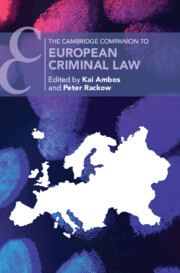Book contents
- The Cambridge Companion to European Criminal Law
- Cambridge Companions to Law
- The Cambridge Companion to European Criminal Law
- Copyright page
- Contents
- Notes on Contributors
- Preface
- Table of Cases
- Abbreviations
- Part I Foundations of European Criminal Law
- Part II Purposes and Principles
- 3 Human Rights Protection through the Lens of the EU Charter of Fundamental Rights and the ECHR
- 4 Primacy, Duty of Loyalty and Interpretation
- 5 Supranational Criminal Law, Harmonisation and Approximation
- 6 Mutual Recognition and Mutual Trust
- Part III European Substantive Criminal Law
- Part IV European Criminal Procedure
- Part V Institutions
- Part VI Perspectives
- Bibliography
- Index
- References
6 - Mutual Recognition and Mutual Trust
from Part II - Purposes and Principles
Published online by Cambridge University Press: 09 February 2023
- The Cambridge Companion to European Criminal Law
- Cambridge Companions to Law
- The Cambridge Companion to European Criminal Law
- Copyright page
- Contents
- Notes on Contributors
- Preface
- Table of Cases
- Abbreviations
- Part I Foundations of European Criminal Law
- Part II Purposes and Principles
- 3 Human Rights Protection through the Lens of the EU Charter of Fundamental Rights and the ECHR
- 4 Primacy, Duty of Loyalty and Interpretation
- 5 Supranational Criminal Law, Harmonisation and Approximation
- 6 Mutual Recognition and Mutual Trust
- Part III European Substantive Criminal Law
- Part IV European Criminal Procedure
- Part V Institutions
- Part VI Perspectives
- Bibliography
- Index
- References
Summary
With the principle of mutual recognition, the EU facilitates effective and efficient law enforcement cooperation among its Member States. Foreign judicial decisions are treated like domestic decisions, while differences in the national criminal justice systems are maintained. Prolonged examinations are no longer necessary and “safe havens” for criminals are closed. The basis of this cooperation, however, is mutual trust in the rule of law. The author uses, inter alia, the current example of Encrochat to show concrete possibilities for application. There, the French criminal authorities achieved a considerable cross-border investigative success by decrypting crypto-mobile devices of that company, which were frequently used by criminals. Through the recognition and execution of European Investigation Orders in France, those findings could also be used in other Member States and considerable prosecution successes achieved. However, the scope and variety of such measures can lead to problems: Only corresponding measures can be recognised. Violations of the Charter of Fundamental Rights EU must not be enforced. Inhumane treatment of detainees may prevent the enforcement of a European Arrest Warrant in individual cases. The loss of trust in the rule of law in some Member States, the EUs reaction to this danger and the control function of CJEU decisions are currently determining legal policy.
- Type
- Chapter
- Information
- The Cambridge Companion to European Criminal Law , pp. 131 - 154Publisher: Cambridge University PressPrint publication year: 2023
References
Further Reading
- 1
- Cited by

